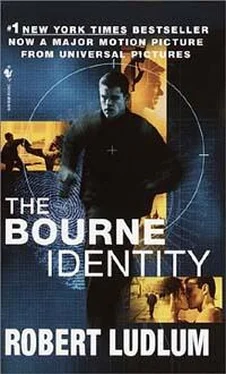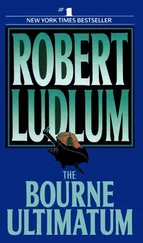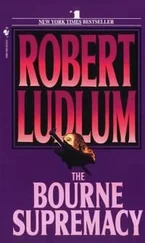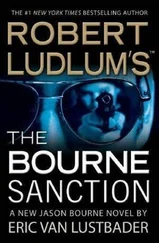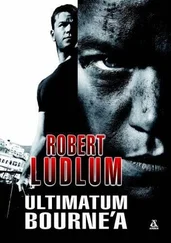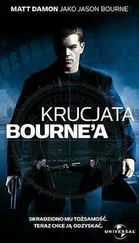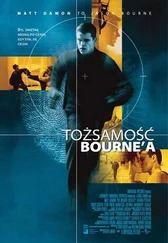Bourne held his breath and looked through the opposite window at the Carillon du Lads entrance; the scene under the canopy explained the attendant’s sudden decision to hurry. An argument had broken out between the police and a group of hotel guests. A line had formed, names checked off for those leaving the hotel, the resulting delays angering the innocent.
“Let’s go,” said Jason, wincing again, the pain shooting through his chest. “We’re clear.”
It was a numbing sensation, eerie and uncanny. The three triangles were as he had pictured them: thick dark wood raised in bas-relief on white stone. Three equal triangles, abstract renditions of chalet roofs in a valley of snow so deep the lower stories were obscured. Above the three points was the restaurant’s name in Germanic letters: DREI ALPENHAUSER. Below the baseline of the center triangles was the entrance, double doors that together formed a cathedral arch, the hardware massive rings of iron common to an Alpine château.
The surrounding buildings on both sides of the narrow brick street were restored structures of a Zurich and a Europe long past. It was not a street for automobiles; instead one pictured elaborate coaches drawn by horses, drivers sitting high in mufflers and top hats, and gas lamps everywhere. It was a street filled with the sights and sounds of forgotten memories, thought the man who had no memory to forget.
Yet he had had one, vivid and disturbing. Three dark triangles, heavy beams and candlelight. He had been right; it was a memory of Zurich. But in another life.
“We’re here,” said the woman.
“I know.”
“Tell me what to do!” she cried. “We’re going past it.”
“Go to the next corner and turn left. Go around the block, then drive back through here.”
“Why?”
“I wish I knew.”
“What?”
“Because I said so.” Someone was there … at that restaurant. Why didn’t other images come? Another image.
A face.
They drove down the street past the restaurant twice more. Two separate couples and a foursome went inside; a single man came out, heading for the Falkenstrasse. To judge from the cars parked on the curb, there was a medium-sized crowd at the Drei Alpenhäuser. It would grow in number as the next two hours passed, most of Zurich preferring its evening meal nearer ten-thirty than eight. There was no point in delaying any longer; nothing further came to Bourne. He could only sit and watch and hope something would come. Something. For something had; a book of matches had evoked an image of reality. Within that reality there was a truth he had to discover.
“Pull over to your right, in front of the last car. We’ll walk back.” Silently, without comment or protest, the St. Jacques woman did as she was told. Jason looked at her, her reaction was too docile, inconsistent with her previous behavior. He understood. A lesson had to be taught. Regardless of what might happen inside the Drei Alpenhäuser, he needed her for a final contribution. She had to drive him out of Zurich.
The car came to a stop, tires scraping the curb. She turned off the motor and began to remove the keys, her movement slow, too slow. He reached over and held her wrist; she stared at him in the shadows without breathing. He slid his fingers over her hand until he felt the key case.
“I’ll take those,” he said.
“Naturally,” she replied, her left hand unnaturally at her side, poised by the panel of the door.
“Now get out and stand by the hood,” he continued. “Don’t do anything foolish.”
“Why should I? You’d kill me.”
“Good.” He reached for the handle of the door, exaggerating the difficulty. The back of his head was to her; he snapped the handle down.
The rustle of fabric was sudden, the rush of air more sudden still; her door crashed open, the woman half out into the street. But Bourne was ready; a lesson had to be taught. He spun around, his left arm an uncoiling spring, his hand a claw, gripping the silk of her dress between her shoulder blades. He pulled her back into the seat, and, grabbing her by the hair, yanked her head toward him until her neck was stretched, her face against his.
“I won’t do it again!” she cried, tears welling at her eyes. “I swear to you I won’t!” He reached across and pulled the door shut, then looked at her closely, trying to understand something in himself. Thirty minutes ago in another car he had experienced a degree of nausea when he had pressed the barrel of the gun into her cheek, threatening to take her life if she disobeyed him.
There was no such revulsion now; with one overt action she had crossed over into another territory.
She had become an enemy, a threat; he could kill her if he had to, kill her without emotion because it was the practical thing to do.
“Say something!” she whispered. Her body went into a brief spasm, her breasts pressing against the dark silk of her dress, rising and falling with the agitated movement. She gripped her own wrist in an attempt to control herself; she partially succeeded. She spoke again, the whisper replaced by a monotone. “I said I wouldn’t do it again and I won’t.”
“You’ll try,” he replied quietly. “There’ll come a moment when you think you can make it, and you’ll try. Believe me when I tell you you can’t, but if you try again I will have to kill you. I don’t want to do that, there’s no reason for it, no reason at all. Unless you become a threat to me, and in running away before I let you go you do just that. I can’t allow it.”
He had spoken the truth as he understood the truth. The simplicity of the decision was as astonishing to him as the decision itself. Killing was a practical matter, nothing else.
“You say you’ll let me go,” she said. “When?”
“When I’m safe,” he answered. “When it doesn’t make any difference what you say or do.”
“When will that be?”
“An hour or so from now. When we’re out of Zurich and I’m on my way to someplace else. You won’t know where or how.”
“Why should I believe you?”
“I don’t care whether you do or not.” He released her. “Pull yourself together. Dry your eyes and comb your hair. We’re going inside.”
“What’s in there?”
“I wish I knew,” he said, glancing through the rear window at the door of the Drei Alpenhäuser.
“You said that before.”
He looked at her, at the wide brown eyes that were searching his. Searching in fear, in bewilderment. “I know. Hurry up.”
There were thick beams running across the high Alpine ceiling, tables and chairs of heavy wood, deep booths and candlelight everywhere. An accordion player moved through the crowd, muted strains of Bavarian music coming from his instrument.
He had seen the large room before, the beams and the candlelight printed somewhere in his mind, the sounds recorded also. He had come here in another life. They stood in the shallow foyer in front of the maître d’s station; the tuxedoed man greeted them.
“Haben Sie einen Tisch schon reserviert, mein Herr?”
“If you mean reservations, I’m afraid not. But you were highly recommended. I hope you can fit us in. A booth, if possible.”
“Certainly, sir. It’s the early sitting; we’re not yet crowded. This way, please.”
They were taken to a booth in the nearest corner, a flickering candle in the center of the table.
Bourne’s limp and the fact that he held on to the woman, dictated the closest available location.
Jason nodded to Marie St Jacques; she sat down and he slid into the booth opposite her.
“Move against the wall,” he said, after the maitre d’ had left. “Remember, the gun’s in my pocket and all I have to do is raise my foot and you’re trapped.”
Читать дальше
